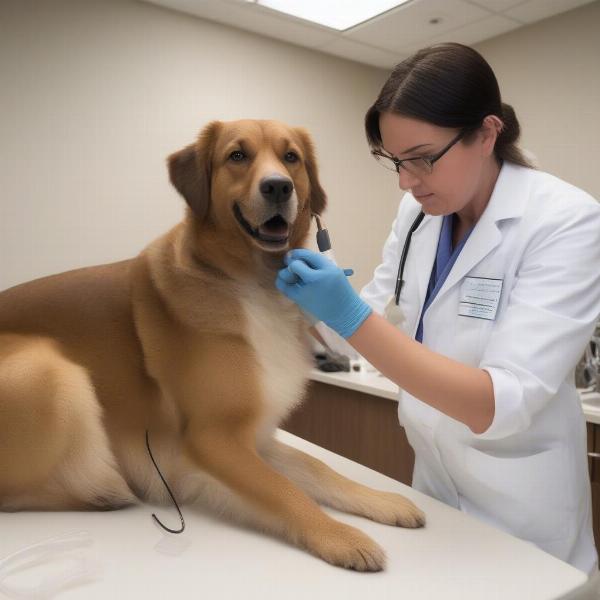The term “gram dog” often refers to dogs featured on Instagram, showcasing their adorable antics, fashionable outfits, or simply their everyday lives. However, beyond the filtered world of social media, understanding what truly constitutes responsible dog ownership and care is paramount. This guide delves into the essential aspects of caring for your furry friend, from breed selection and healthcare to training, nutrition, and much more. Whether you’re a seasoned dog owner or considering welcoming a new pup into your home, this guide offers valuable insights into providing your “gram dog” with a happy, healthy, and fulfilling life.
Choosing the Right Breed for Your Lifestyle
Before bringing a dog home, it’s crucial to research different breeds and consider which one best suits your lifestyle. Factors like living space, activity level, and personal preferences all play a role. Energetic breeds like Border Collies require ample exercise, while smaller breeds like French Bulldogs may be better suited to apartment living. Don’t forget to consider grooming needs as well. Long-haired breeds like Afghan Hounds require regular brushing, while short-haired breeds like Beagles are relatively low-maintenance.
Ensuring Your Dog’s Health and Wellbeing
Regular veterinary checkups are essential for preventative care. Vaccinations, parasite prevention, and dental care are crucial for maintaining your dog’s health. Early detection of health issues can significantly improve treatment outcomes. Observe your dog for any changes in behavior, appetite, or energy levels, and consult your vet if you notice anything unusual. Dr. Emily Carter, DVM, emphasizes, “Preventative care is the cornerstone of responsible dog ownership. Regular checkups can save you heartache and expense in the long run.”
 Dog Health Checkup
Dog Health Checkup
Training and Socialization: Building a Strong Bond
Training and socialization are vital for a well-behaved and happy dog. Start training early, using positive reinforcement techniques like praise and treats. Socialize your puppy with other dogs and people to help them develop appropriate social skills. Basic obedience commands like sit, stay, and come are essential for safety and control. “Consistent training builds a strong bond between you and your dog, fostering trust and mutual respect,” says renowned dog trainer, Mark Johnson.
Nutrition and Feeding: Fueling Your Dog’s Adventures
Providing a balanced diet is key to your dog’s overall health and longevity. Choose high-quality dog food appropriate for your dog’s age, breed, and activity level. Avoid feeding table scraps, as many human foods can be toxic to dogs. Consult your vet for personalized dietary recommendations. 25 kg dog food specials might be a good option for owners of large breeds.
Grooming Essentials: Keeping Your Dog Looking and Feeling Their Best
Regular grooming keeps your dog’s coat clean and healthy, preventing matting and skin irritations. [what does ring worm look like on a dog](https://ilmdog.com/what-does-ring-worm-look like-on-a-dog.html) offers valuable insights into identifying and treating common skin issues. The frequency of grooming depends on your dog’s breed and coat type. Regular brushing, bathing, and nail trimming are essential. A monogrammed dog bandana can add a touch of style to your groomed pup.
Exercising Your Dog: Physical and Mental Stimulation
Regular exercise is crucial for both physical and mental stimulation. Daily walks, playtime, and engaging activities keep your dog happy and healthy. Tailor the type and intensity of exercise to your dog’s breed and age.
Conclusion
Caring for a dog is a rewarding experience, but it requires commitment and responsibility. From providing proper nutrition and healthcare to ensuring adequate exercise and training, numerous factors contribute to your dog’s overall well-being. By following the guidelines outlined in this guide, you can ensure your “gram dog” lives a happy, healthy, and fulfilling life. Remember to consult with your veterinarian for personalized advice tailored to your dog’s specific needs. An echocardiogram dog may be recommended for certain breeds to monitor heart health.
FAQ
- How often should I take my dog to the vet? Annual checkups are recommended for most dogs, but puppies and senior dogs may require more frequent visits.
- What is the best way to train my dog? Positive reinforcement methods using praise and rewards are generally the most effective.
- What should I feed my dog? Choose a high-quality dog food appropriate for your dog’s age, breed, and activity level.
- How often should I groom my dog? Grooming frequency depends on your dog’s breed and coat type, but regular brushing and bathing are essential.
- How much exercise does my dog need? The amount of exercise varies depending on breed and age, but daily walks and playtime are essential.
- What are the signs of a healthy dog? A healthy dog typically has a shiny coat, bright eyes, a good appetite, and plenty of energy.
- How can I socialize my dog? Expose your dog to a variety of people, dogs, and environments from a young age. nexgard spectra large dogs can help protect your dog from parasites during socialization activities.
ILM Dog is your trusted source for expert advice on dog care and wellbeing. We offer comprehensive information on dog breeds, health, training, nutrition, grooming, and much more. From puppyhood to senior years, we’re here to support you every step of the way. Contact us today for personalized guidance and support. Email: [email protected], Phone: +44 20-3965-8624. ILM Dog is committed to helping you provide the best possible care for your canine companion.